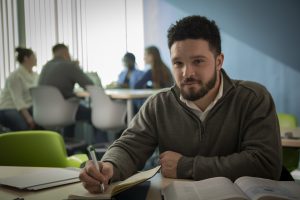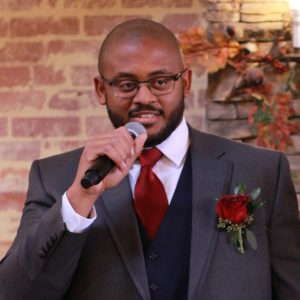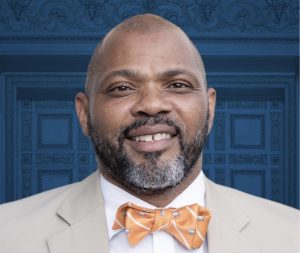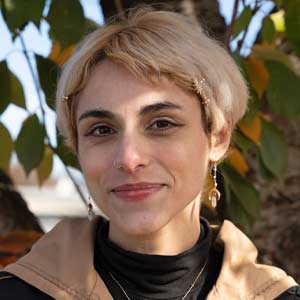Contents
- Inspiring a New Generation — Connor Martin’s Story
- Keeping Ahead of the Competition — Vincent Grigsby’s Story
- Leading the People, Loving the People — Corrie Betts’ Story
What do a mayoral candidate, an NFL-bound coach, and an NAACP president have in common? Aside from resilience, an intrinsic sense of calling, and a positive outlook, these professionals have an undeniable ability to lead and inspire others.
For alumni Connor Martin, Vincent Grigsby, and Corrie Betts, Goodwin’s master’s in Organizational Leadership (MSOL) program was an indispensable stepping stone — helping them harness their voices as leaders while reinforcing their drive to achieve their dreams.

Inspiring a New Generation — Connor Martin’s Story
For MSOL graduate and mayoral candidate Connor Martin, his drive to make a difference has never been higher. First appearing on the political stage after being elected to the East Hartford Town Council, Connor rose to become the current mayor’s chief of staff, whose endorsement he’s now receiving for his own candidacy. “With the current mayor, we made significant progress in economic development,” Martin reflects. “I’d like to continue supporting and overseeing that.”
But Martin also vies to bring his own visions to East Hartford — a town holding a special place in his heart. Beyond being his hometown, Martin believes East Hartford has incredible potential. “With our proximity to Hartford, the riverfront, our parks and activities, and the development of surrounding regions, East Hartford has a suburban feel while still having the perks of living in a city.”
A community that many call home
Aside from being situated in an ideal location, Martin feels East Hartford is unique for another reason — the incredible people who call it their home. “The diversity of East Hartford is great,” he notes. “It’s truly a melting pot of cultures and ethnicities, which sets us apart from other municipalities. Having such a rich culture is a benefit we can tap into, which can modify our worldviews in a meaningful way — creating a better town and residency.”
In Martin’s perspective, Goodwin has played an essential role in defining and creating opportunities for the people of East Hartford. “Goodwin has established itself as the highest quality education provider in our community,” Martin offers. “As an employer and educator, Goodwin creates opportunities that mutually benefit residents, the community, and the school. They provide training so locals can achieve stable, well-paying jobs in industries like healthcare and manufacturing, which already operate in our town. This also supports our local economy.”
A one-of-a-kind place to grow
Martin’s affinity for Goodwin doesn’t only spring from his own experiences as a student — having spent 13 years as a University employee, he has an in-depth understanding of what makes Goodwin one-of-a-kind.
Serving as facilities director, Martin beautified and bettered the Goodwin landscape for students and staff alike. If you ever sought serenity in the butterfly garden, enjoyed our campus’ iconic art and architecture, or passed time in the veteran garden, you’ve admired Martin’s work first-hand.
For students and employees alike, there’s no denying that Goodwin is a game-changer. Such was also the case for Martin, who pursued his education while he wasn’t on the clock. Although Martin enjoyed his employment at Goodwin, he had long-term aspirations in mind. “I knew I wanted to be a hardworking, reputable person known for my work in the community. I knew I wanted to be involved in government and maybe even run for mayor,” Martin recounts.
As he continued working and learning at Goodwin, Martin felt further inspired to bring his career in public service to the next level. He earned associate and bachelor’s degrees in Business Administration before finding himself at an impasse — his age.
“I was too young to have the work experience I’d need to qualify for a higher-level job in government,” he describes. “I determined that the best thing I could do to continue advancing my career was pursue a higher-level degree.”
Preparing to lead the public
Through this line of thinking, Martin decided to take the most critical career step he’d taken to date — he chose to pursue his MSOL.
Landing on the MSOL program as the best option for his future was an easy decision. “Not only does an MSOL look great on a resumé, but the degree is broad enough to take you anywhere,” Martin describes. “The program teaches students how to become emotionally and culturally competent, and you learn how to help, leverage, and inspire others.”
Furthermore, Martin appreciated the flexibility of this degree. “It doesn’t limit you to a specific path and sets you apart in the workforce,” he highlights. “Earning your MSOL is about learning how to get to know people, motivate them, and lead them — ensuring the success of any organization. The lessons you learn in the MSOL program have lifelong applicability.”
All these factors lent themselves to Martin’s big-picture goal to inspire change in the East Hartford community. Aside from providing him with more advanced credentials, earning an MSOL would help him build and refine universal skills essential to compassionate and efficient public service.
Starting with you
While learning these skills is indispensable, it’s not the only way our MSOL program fosters future leaders. True to Goodwin’s student-centered vision, the MSOL program starts with you. “Earning my MSOL degree taught me about myself and my leadership style,” Martin shares.
Through the MSOL program, Martin gained greater assurance of his own value — increasing his confidence and sense of self.
As an aspiring government leader, the power of this lesson was invaluable. “Until you know who you are, you don’t know where you can go,” Martin offers. “You need to know your own potential to imagine what your future can look like.”
Martin also found a guiding light in the mentorship of MSOL program director Sandi Coyne-Gilbert. “Sandi supports your confidence and keeps you present in the moment, encouraging you to explore things from new and positive perspectives,” Martin illustrates. “She reminds you that you should only worry about what you can control right now and that it’s critical not to let yourself spiral into negative thoughts.”
For Martin, the power of Coyne-Gilbert’s mentorship did more than help him earn his master’s — she played an unforgettable role in defining the career he has today. “Sandi is half of why I’m here,” he shares happily. “Her mentorship has helped me become more grounded in who I am, more self-assured, and more confident in the skills I can offer in any situation. This is especially important for young people moving into leadership roles in intimidating industries, where they may have to manage people twice their age.”
Encouraging future leaders
As a Millennial entering the political sphere, this lesson was critical for Connor Martin. “I was always interested in government and wanted to be an example for my generation as to what it means to get involved.” He continues, “I wanted to show our generation why that’s important.”
Martin believes that civic engagement is especially important in towns like East Hartford. “We’re one of the most diverse Connecticut towns,” he explains. “In politics, leadership often falls to older white men who don’t reflect the diversity of the people they serve. Our generation needs to understand the importance of leading by example.”
With the motivation, self-insight, and skills earned through the MSOL program, Martin has found it less intimidating to enter politics as a young leader. Furthermore, he’s confident other Millennial and Gen Z adults will begin making their way to the table. “Through the turbulent 2016 election, COVID-19, George Floyd’s death, and the justice movement, young people are finally paying more attention,” Martin observes. “Social media and recording technology have opened new doors, and people care more than ever. People are looking to who leads and represents them and questioning whether these leaders genuinely have their best interests in mind.”
As a politician, Martin also values how social media keeps government leaders connected to those they serve. “It’s made it harder to hide under the radar,” he describes. “Now, we’re always engaging with our constituents. This is crucial — and long overdue. It helps to be relatable and willing to share your experiences. It’s important to helping residents feel like East Hartford is their home.”
Confidence is key
From his experiences as facilities director to those as an MSOL student and the mayor’s chief of staff, Martin is now in a position to affect change — a goal he’s long sought to achieve. Reflecting on every step of this journey thus far, he finds immense gratitude in what the MSOL program — and Sandi Coyne-Gilbert — have offered him along the way. “If you lack confidence and self-identity, learning who you are through the MSOL program can help you change the narrative from what you don’t have to what you do,” he offers. “You can gain the confidence to put yourself out there.”
At Goodwin, we understand that leadership starts with you. Our MSOL program will help you unleash the leader within — helping you gain the skills, self-esteem, and understanding necessary to be an inclusive, considerate, and authentic leader. Learn more about our MSOL program today!
Keeping Ahead of the Competition — Vincent Grigsby’s Story

This past summer, Vincent Grigsby achieved something many college football coaches only ever dream of — being invited to speak at the American Football Coaches Association (AFCA) conference. As a seasoned coach with NFL aspirations, this was a landmark step in achieving his dream. “Speaking at the AFCA Conference is a big deal in the coaching profession,” Grigsby explains. “It’s essentially an endorsement of your professional goals.”
For Grigsby, this honor was also reinforcing. “It reinvigorated my drive,” he offers. “I have my own confidence and self-assurance, but the recognition is uplifting.”
Embracing the brotherhood
Grigsby’s journey hasn’t always been easy. Growing up in California, he hit a significant hurdle when high school football career was cut short by an injury. “It left a fire burning in my soul,” he recalls. “Football wasn’t something I always embraced as a big part of myself, but it truly is. I love the brotherhood and competition of it.”
So, at nineteen-years-old, Grigsby continued pursuing his passion for football, not as a player, but as a coach. After investing three years in the profession, he earned an exciting opportunity — receiving an invite to attend a clinic highlighting minority coaches, where Grigsby would rub shoulders with affluent NFL and Division I coaches. “I was networking and being close to people I’d only ever seen on TV,” he recounts. “It was reinforcing, and it built my confidence.”
However, the greatest reinforcements often are found within us. Grigsby found this, too, when driving home from a particularly challenging practice. A man of deep religious faith, Grigsby was overcome by the sense that he was on the path he was meant to pursue. “I felt as though I heard a voice reassuring me of my hope and belief that, one day, I’d coach in the Super Bowl,” he recounts. “That moment made me commit and dive into the profession.”
Finding the right fit
Grigsby emphasizes that, as a coach, you go wherever opportunity takes you. That’s how he first found his way to Bethany College in Kansas, where he served as offensive line coach and, eventually, as interim head coach.
It’s here that you may find yourself asking how a California native living in Kansas found his way to a Connecticut-based college. Grigsby remembers how he arrived at the decision to pursue his master’s at Goodwin. “My wife wanted to pursue her master’s and she encouraged me to do it, too,” he recounts. “Given my goals and plans to coach or work as a general manager for the NFL, the MSOL program seemed like a perfect fit. Not a lot of schools offer organizational leadership programs, especially not in a hybrid or online format. The Goodwin program set itself apart by being so flexible.”
Grigsby also notes that the efficient timeline of our MSOL program added to its appeal. “Classes were 6-7 weeks long, which was great for my schedule.”
Kickstart your understanding
After beginning the MSOL program, Grigsby was stricken by how Goodwin differs from other universities. “I couldn’t have asked for a better program,” he reflects. “Before moving to Kansas, I was in California working on a degree to become a high school teacher. I just felt like a cog in a wheel. Every college graduate who thought about teaching in California seemed to be in that class. The density made you feel like a number, and I felt like I was going through all of it just to get a piece of paper.”
Grigsby quickly discovered Goodwin’s MSOL program to be a full departure from this experience. Aside from small class sizes in an online cohort (in which he was joined by his wife,) he enjoyed the ability to truly engage with his mentors. “All the professors in the program were open and had strong teaching styles.”
With the guidance of professors Mary Jean Thornton, Jessica Fraga, and Kate Bolduc, Grigsby completed coursework that refined his understanding of what it means to lead his team. “I learned to go beyond the assignment itself and meld facts with ideals,” he describes. “Learning that changed my approach to leadership because I realized it can’t just be about looking like I’m doing all the right things — the reality has to be there, too. That kickstarted my brain.”
Like Connor Martin, Grigsby also found Sandi Coyne-Gilbert’s leadership a source of inspiration. “She’s one of the greatest administrators I’ve ever worked with in my entire life,” he highlights. “Her commitment to her students, honesty, and willingness to work with you through any issues you face make her feel like family from the beginning. My wife and I call her ‘Auntie Sandi’.”
Putting it into perspective
Grigsby found immense, career-relevant value in the final project for the MSOL program — the capstone. “It had a lasting impact on me because it forced me to think about why I’d chosen this path,” he describes. “I chose to focus my project on how minority coaches have always tended to get the short end of the stick and fewer opportunities. A lot of these ideas still linger in football leadership today.”
Grigsby himself has seen this play out in the field. “Historically, Black coaches are given less time to turn a team around. As a minority, the opportunities are there on paper. But you have to ask yourself if they’re really there.”
Through his capstone project, Grigsby explored this phenomenon and, in the process, gave a new resolution to his goals. “The capstone put things back into perspective. I’m preparing for the rest of my life. The process of reaching my goals must be sound.” Grigsby adds, “This is particularly important for a Black head coach and women in football leadership, too. You always have to be a cut above.”
Head in the game, feet on the ground
In late spring, Grigsby took the trip from Kansas to Connecticut to walk the commencement stage with his favorite classmate — his wife. This moment was a pivotal step toward achieving his goals.
Grigsby knows he’s not at the final stretch yet. In an industry of coaches vying for positions, the competition is both constant and fierce. “There are only so many opportunities and a lot of competition,” he explains. “People hire head coaches they know and trust. A lot of coaches won’t hire someone from off the street, even if they check all the right boxes. It’s a brotherhood. Building trust with people is an unwritten rule and an essential part of the job.”
But Grigsby doesn’t plan to let the competition distract or dishearten him. He’s in it for the long haul, and knows that the best way to reach the end zone is to focus on the here and now. “While you can strategically prepare for the career you want, it’s critical to keep your head in the game and be where your feet are,” he offers. “You don’t want to be in your current job thinking about your next job. So, I focus on being the best offensive line coach that I can be.”
As for now, Grigsby will continue not only coaching, but connecting with industry leaders. “I went to a coach’s clinic in February and was alone with Jim Caldwell, a former NFL head coach, for ten minutes because I showed up early,” Grigsby recounts.
Wherever the road takes Vincent Grigsby next, he’s confident his education will help him stand out against the competition. “I feel like the MSOL program prepared me to go wherever I decide to. It prepared me to succeed as a leader.”
Curious what Goodwin’s MSOL program can do for your future? Explore our free MSOL Get Started Guide and discover if this degree is the right fit for you!
Leading the People, Loving the People — Corrie Betts’ Story

Corrie Betts lives his life by the incomparably wise words of Dr. Cornel West. An African American philosopher, activist, and intellectual, West famously wrote, “You can’t lead the people if you don’t love the people. You can’t save the people if you don’t serve the people.”
For Betts, this ideal is a personal mantra, informing his current role as President of the Greater Hartford Branch of the NAACP. As an organizational leader, Betts sets his eyes on educational equity, criminal justice reform, economic development, and poverty — many of which are not just concerns of the people, but issues with which Betts has first-hand familiarity.
With his calling as a leader informed by a strong sense of empathy, Betts aspires to be more than an advocate. Rather than simply being a voice for the people, he hopes to impart values of self-advocacy, self-love, and social justice.
From Hartford to higher ed
Coming of age in Hartford, Betts bore witness to the disparaging equity gaps plaguing his community. Like millions of American youths, Betts struggled to sidestep the treacherous trap of a predatory school-to-prison pipeline. By the tenth grade, Betts had dropped out of high school. “I found myself on a path of poor choices, wherein the criminal justice system had become a revolving door,” he recalls.
Eventually, Betts was required to attend a safe space substance abuse program, Youth Challenge of CT. A historic program whose doors opened over 50 years ago, he blazed a unique trail as a participant and, later, as an alumnus. Staying with the program to serve as an intern, Betts eventually rose through the ranks and achieved the role of director.
Through this journey, Betts first found his way to Goodwin University. “The executive director of Youth Challenge of CT encouraged me to pursue my associate degree in Human Services,” Betts recalls. But this was only the beginning — with the encouragement of his advisor and dean, he found the determination to pursue his bachelor’s, too.
However, the influence driving his higher education was not Goodwin University alone; his anchor was the guidance of his mother, whom he sought to make proud. For Betts, she was the North Star, encouraging his pursuit of educational achievement. “She was a single mom, and she taught me how to be a man,” Betts reflects. “She had never seen me walk the stage for a commencement or graduation. When I got my bachelor’s in 2019, she was able to see me walk.”
Reframing the dialogue
Betts gained additional momentum through his growing involvement with the NAACP. While collaborating with the President of the NAACP State Conference during Molloy’s days in office, Betts began encouraging the state to reconsider its conversations about criminal justice. “There were constant discussions, but those who’ve been incarcerated were never invited to the table,” Betts recollects. “I aimed to make them part of the conversation and change the dialogue.”
His work left a powerful impression on local and statewide NAACP leaders — igniting his journey to become the State Conference’s Chair of Criminal Justice, Chair of Political Action, and, eventually, the President of the Greater Hartford NAACP branch. Throughout his journey, the wisdom of other NAACP leaders urged Betts to find more effective ways to enact and inspire social change.
Betts specifically recalls the words of Julian Bond, the late Civil Rights leader and former Chairman of the NAACP. “Bond said you can applaud agencies for stepping up to address issues, but systemic issues must be addressed, too,” Betts describes. “He had an analogy: Imagine we’re walking next to a river. We see a baby coming down the stream, so we both jump in to save it. Another baby comes, and we do it again. Then another comes — but instead of jumping in, I say ‘no more.’ You may wonder why I’m not jumping in. Instead, I’m walking up the hill. I’m going to find out who’s throwing the babies in the water,” he relays. “It’s not just about intervening against dangerous and harmful actions — you must step up and take organized action against negative influences.”
Finding inspiration from empowerment
So, Betts found himself posed with a question — how could he enact change as effectively as possible?
With the guidance of his colleagues, Betts learned that he was missing an essential step in his journey as a leader — he needed to learn to lead himself. “I was conversing with one of my elders about issues that were occurring nationally, statewide, and locally,” Betts describes. “He asked what I can do as an individual to play a role in creating positive change. I was really philosophical in my response, but he told me ‘no’ — I’d missed the mark. In order for me to change anything, he told me I’d have to look within myself first.”
With this realization, Betts began embarking on his next educational milestone — earning his MSOL to become the best and most self-assured leader he could possibly be.
Courageous conversations
As experienced by both Connor Martin and Vincent Grigsby, the MSOL program also allowed Betts the growth-oriented opportunity he’d been waiting for — enabling him to grow his leadership skills, self-reflect, and become better acquainted with himself. “One of the most valuable things I came to understand is what leadership really is,” Betts highlights. “It taught me how to lead myself, which was the key. You can’t have leaders who can’t lead themselves, so you need to have self-accountability.”
In addition to gaining pertinent self-insights, Betts found the MSOL cohort model allowed him to flex his diplomacy and problem-solving skills. “We had a cohort of individuals coming from varying backgrounds, sharing different opinions, and still being respected.” He continues, “That was another valuable thing I learned — it’s okay to have conversations in which people disagree.”
For this reason, conflict resolution was Betts’ favorite class. “I learned how conflict is actually healthy,” he offers. “There can never be a meaningful resolution if everyone always agrees. Nine times out of ten, everyone wants the same outcome, but we all go about things in different ways. We all have egos, but when we learn to set our pride aside, we can have the kinds of conversations that break barriers. I’ve learned to call conflicts ‘courageous conversations’.”
Leaving a lasting legacy
Following the thread of fellow his MSOL graduates, Betts also found immense inspiration in the leadership of Sandi Coyne-Gilbert. She served as a guiding light as he pursued his master’s — even more so when rocky seas robbed Betts of his ballast. “When I was earning my MSOL, I lost my mom,” Betts openly and honestly shares. “The support given to me during that time was inspiring. Sandi Coyne-Gilbert was awesome and pushed me not to give up. She has a motherly energy and will tell you when you’re falling short.”
Coyne-Gilbert’s leadership instilled another invaluable lesson, too: great leaders don’t just lead in the moment but inspire a lasting legacy — leaving the torch well-lit for future generations. “It’s something we always talked about with Sandi,” Betts delineates. “Great leaders make leaders. You need to be able to pass things forward and ensure there are individuals who can grab a hold of the vision and keep persisting forward with it.”
Embracing our gifts
As he earned his MSOL, Betts realized that authentic leadership directly spoke to the precepts his NAACP colleagues had encouraged — he must lead and love himself before he could genuinely guide anyone else.
“A friend asked me a question once,” Betts relays. “They said, ‘What are you afraid of? Failure, success, or both?’ At that moment, I realized I was afraid of both. Instead of embracing our gifts, we sabotage ourselves. But we should embrace our gifts and the process of using them. Our gifts are meant to be shared.”
“In becoming a leader, I’ve learned to get out of my own way and embrace the process,” he continues. “If you think too hard about it, you’re not going to do it. Instead, embrace the process. We all have abilities we’re born with, but we often don’t know how to embrace them.”
It starts with self-love
For Corrie Betts, the months leading to his MSOL commencement was a season of unexpected opportunity. Aside from being invited to deliver the commencement speech at South Florida Bible College, he received an honorary doctorate for outstanding leadership and public service. “If you were to ask me this ten years ago, I wouldn’t have known,” he humbly reflects.
In many ways, receiving this honor was merely icing on the cake. “For me, it’s less about talking and more about doing,” he emphasizes. “It’s more about being a part of something.”
With motivation and determination in his pocket, Betts continues focusing on the big picture. Above all else, he aspires to lead young people down a positive, self-affirming path. “I want to start a nonprofit tapping into performing arts and technology,” he explains. “My heart’s desire is to create safe spaces for youth and allow them to dream. It’s important that adults let them know it’s alright to dream, even when society has limited them and given harsh guidelines for acceptance.” He continues, “Art is a form of expression, and when people don’t have the means for a dialogue, it makes for an excellent outlet.”
Marrying the most difficult days of his past to the promise contained by the present moment, Betts pulls an essential thread from his personal journey — leaders can’t be born until you foster self-love. “People say that they have no regrets, but people need to be okay with having regrets. Regrets allow us to grow,” he offers. “The most important relationship we have is with ourselves. When we love who we are, we can live in alignment with who we are.”
Putting future leaders at the forefront
At Goodwin University, every day is an opportunity to blaze your own trail and define your own future. When you enroll in our MSOL program, you’ll develop into the leader you were always meant to be — affecting positive change and inspiring others to help carry the torch. Our flexible, student-centered program can be completed online or in a hybrid format — allowing you to tailor your studies to your personal and professional needs. With small cohort sizes, a compassionate faculty of experts, and comprehensive student support services, you’ll always be more than a number at Goodwin. We start with you.
Ready to begin your Goodwin journey? Contact us today! Call 800-889-3282 or text 860-467-1511.

Bri Gagné is a marketing content writer at Goodwin University, bringing backgrounds in literary studies, creative storytelling, Universal Design for Learning (UDL), and social justice. They earned their bachelor’s degree in English Literature and Film Studies from University of Connecticut and a master’s in education from Eastern Connecticut State University.
After teaching English abroad and locally, Bri transitioned to a full-time writing career, contributing to the University’s educational narratives and brand-building efforts. They plan to begin their Master of Fine Arts in creative writing in 2025.

